Refugee crisis 'impossible to handle' in Turkey
- Published
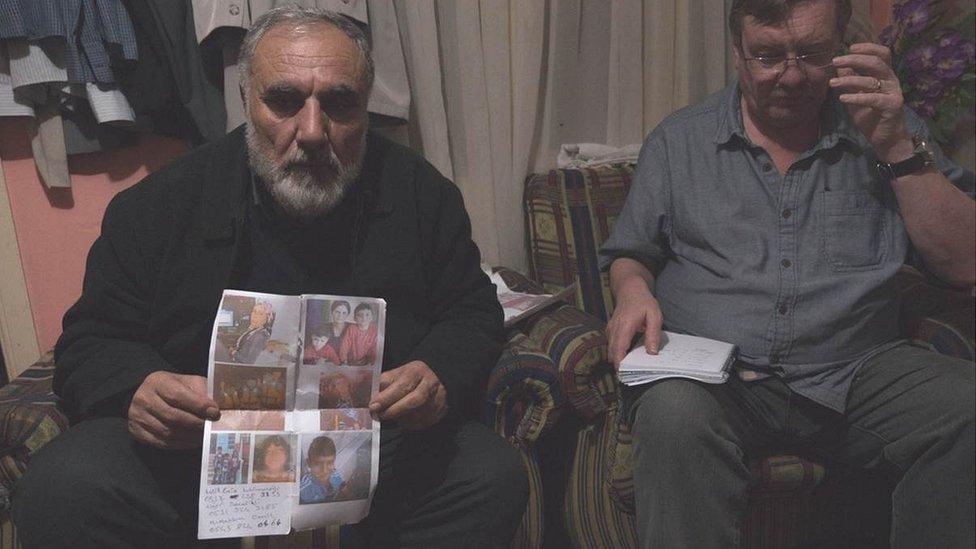
Jamal lost 13 members of his family when their boat sank on the way to Greece
As Jamal talks, he fingers a creased, worn photocopy of seven faded pictures. The faces of 13 dead members of his family stare from the paper. They were all Kurds from Syria, who drowned when their boat sank off the Turkish coast on the way to Greece.
"This is my wife, Nejah Akli. That's my daughter-in-law, Sherin Muzafar. These are my grandchildren, Ma'sum and Muhamet…
"The engine died. It happened at around eight in the morning - we'd only crossed halfway and were still in Turkish waters," says Jamal. "Water flooded in and the boat began to sink. Ten of the children and three of the women were trapped below deck. We were in the water for four hours and then a fisherman rescued us.
"He called the coastguard. We told them that 13 people were still under the water and begged them to do something. We said, 'Brothers, please do something to help us, for the sake of God and for the sake of [the prophet] Muhammad.'"

Find out more:
Listen to Mark Mardell's full report from Turkey on BBC Radio 4's The World This Weekend.

The tragedy happened three months ago, and many others have suffered such grotesque loss since then. Turkey is a pivotal country, in a critical region. For the European Union, it is the key to solving the migration crisis, external that haunts the continent.
We are in a tiny house in the back streets of Izmir, with Jamal and the other survivors - his son and his wife and three teenage daughters.
"I thought I would never get out alive," said 14-year-old Hemri. "When we were rescued, I just kept crying and crying. All I could think of was where was my mum - I kept asking them. I asked the fishermen, 'Please look everywhere - see if you can find them.'"
The EU believes if it can stop people making the journey by boat to Greece, those who make it over the Syrian border will stay in Turkey.
Jamal does not think many will be persuaded.
"Syria is gone, Syria no longer exists," he says.
"Prices of goods are high here in Turkey. The rent for this small, shattered house is $300 (£210) a month. Our children can't go to school here - education isn't available for us.
"Europe is better because the Europeans are caring and kind-hearted. Europe respects human beings and cares about human rights."
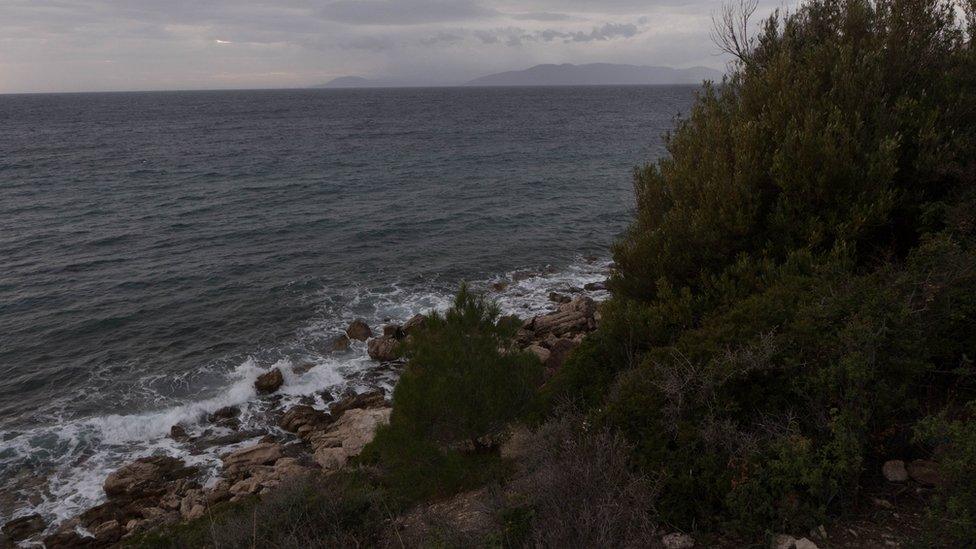
The Greek island of Lesbos is six miles from Turkey
A little later I am standing on a scrubby hillside above a little cove, looking out at a rough gunmetal sea and the low shadowy outline of an island, like a luring, promised land.
More famed in the past for the poet Sappho's, external sexuality, the Greek island of Lesbos, just six miles from the Turkish coast, is now seen as one gateway to the European Union, external.
The litter strewn around the rocks and pine trees tells a story. Life jackets, foot pumps, inflatable rubber rings, a child's rucksack in the shape of a frog, a pair of underpants.
'Death jackets'
In the last few days, about 700 would-be migrants were gathered here and in other such bays around the seaside town of Dikili, external. They were stopped from travelling by the coastguard and bussed back to Izmir.
Hammed Hussein is a man with a dry sense of humour and an unenviable job. As head of Dikili's cleansing department he has the job of clearing up after the people who mass in these areas. He tells me, "They are our winter tourists" and points to the abandoned bright orange vests - "I call them death jackets".
Figures recently released by the International Organisation for Migration, external show more than 77,000 have made the journey from Turkey to Greece so far this year - 320 have drowned during that time.
Hammed says: "The government, the coastguard, works 24 hours a day. The smugglers work 24 hours, too - they just wait for the breaks."
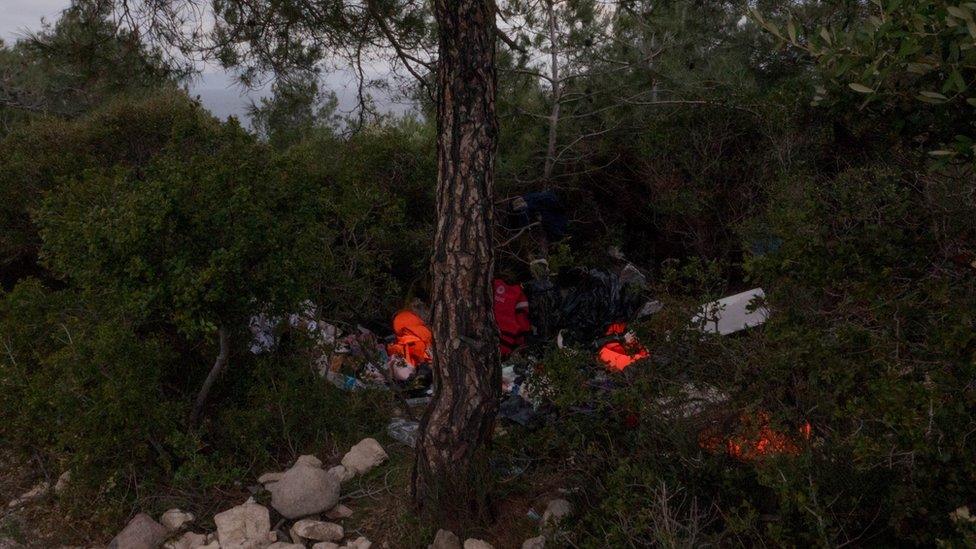
Life jackets litter the trees near the beach
I think of the words of the deputy mayor, Chedam Elibol, as we travel along this winding coast line.
"They come all the way from the Syrian border, hundreds of miles away, to our long coastline, 40 miles of it - lots of little bays, lots of places you can hide," she said. "The mayor asked the security people to block the roads to the beaches, so they can be stopped, but it just didn't happen."
She added: "Today, I heard two Syrians were drinking beer at the beach. When they were asked what they were doing, they said, 'We're going to finish our beer and swim across to Lesbos'. The man who found them convinced them they would die and not to do it. They've been sent back to Dikili - but they may try again."
'Idiot'
Many in Turkey feel a little like Canute, expected to halt something akin to a relentless natural phenomenon. There is a resentment that the European Union is simultaneously calling on the country to throw open the borders with Syria and stop them travelling on to Europe.
Recently, the powerful President Recep Tayyip Erdogan said they were being treated like someone who had the word "idiot" written on their forehead, external. The 3 billion euros promised by the EU hasn't materialised, external. He has said if nothing happens, he'll put the migrants on planes and buses and send them on to Europe, external anyway.
It is hardly surprising Turkey behaves like a once spurned and jilted lover.
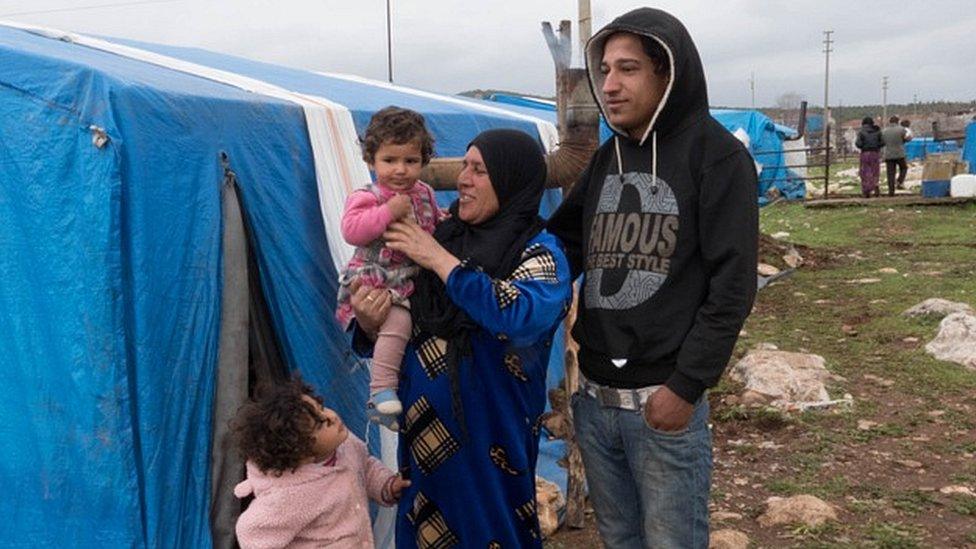
Refugees live with no sanitation in the unofficial Torbuli camp in Turkey
You have to remember there is a lot of history here - Turkey first applied to join the European club, external more than 50 years ago, long before the UK and all the eastern countries dreamt of such a future, external.
It has been kept at arm's length - partly because of fears of mass migration from a Muslim country. President Erdogan, in his early days of power as prime minister, was very keen on forging ahead with a full relationship - but Austria, France and Germany made it clear it was unlikely Turkey would ever be allowed in.
That changed Turkey's mood and internal politics. Now the EU is cuddling up again - you can hardly be surprised Turkey will need some convincing.
Even by its own standards, the EU has been tardy. The deal outlined last November has been held up by Italy, angry about the way the entirely separate problem of its budget was being treated. Now that is out of the way but the money still has not arrived. The spokesperson for the European Commission on Migration told us: "The Commission is ready to deploy funding as soon as appropriate projects have been programmed and contracted."
He added that the 3 billion euros "is intended to help Syrian refugees in Turkey, it is not provided to the Turkish authorities".
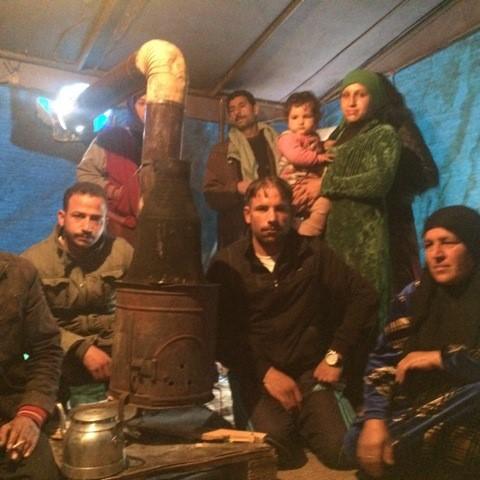
A family huddles inside a tent in the Torbuli refugee camp
Judging by the conditions at the unofficial Torbuli camp, they could do with some help. Small girls, dirty and full of the joy of life, are skipping across a big rope and gather round giggling to look at the pictures I take of them.
They, and about 1,000 other people from Syria, are living on a farmer's land, where they are picking cauliflowers. They live in blue plastic tents, torn so a crooked metal chimney can stick out of the side.
The nearest clean water comes from a standpipe more than a mile away. I count 14 buckets and containers - drinking water for 1,000 people. There are no toilets, no sanitation. These people do not want to go to Europe, but want jobs.
A law to allow them to get work permits is stuck in parliament, and people from outside Turkey can't officially be given refugee status. I am shown around the camp by the dynamic founder of "People's Bridge", a surgeon and past president of the European Society of Surgery, external, Professor Cem Terzi.
He says: "These conditions are very, very bad. Any kind of health problem, you can find it here. Lung infections, diarrhoea, gastroenteritis, any infectious disease. And there are lots of new-born babies and no vaccinations."
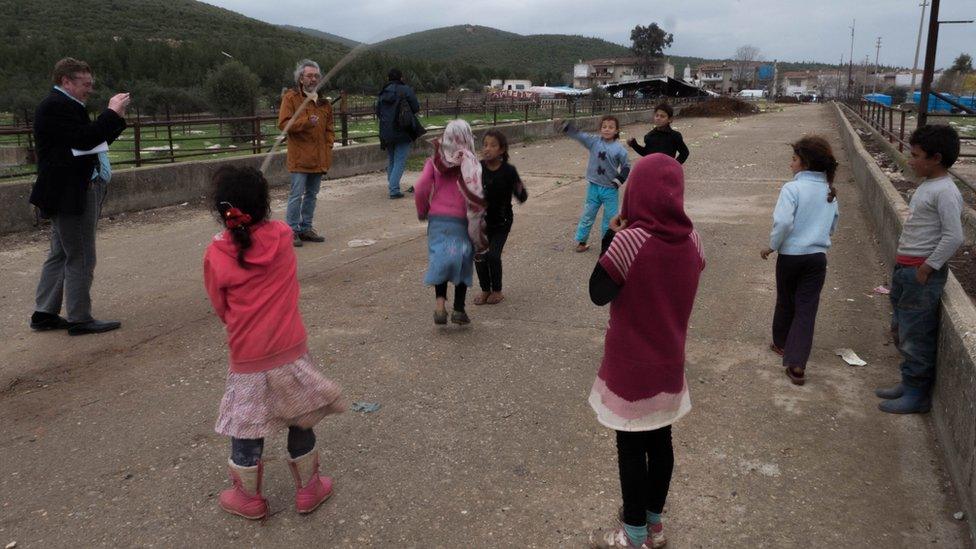
Children at the Torbuli camp skip as Mark Mardell (left) and Prof Cem Terzi watch
Back in his office, looking a little worn between operations, he asks if we mind if he smokes.
"The Turkish population has been very friendly," he says. "They shared their houses and their food. But they thought it was temporary. The public understand they will stay - three million people. There will be social and political changes - Turkish people will lose their jobs, and start to hate the refugees."
Turkey is beset by the Syrian civil war which has brought the country into conflict with Russia, sharpened the problem with Kurds and even raised the possibility of war.
The country's economy is faltering and many see the president drifting away from democracy towards autocracy. The sense that the EU wants the balloon squeezed at both ends to stop its problems is acute.
Dr Terzi says: "You can't not handle three million people in one country - we need help, from Europe, from rich Arab countries. It it will not work, it is very dangerous."